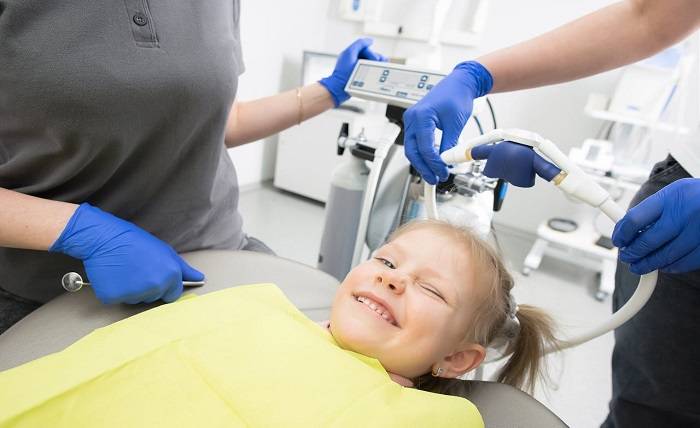Oral health is an essential part of your child’s overall well-being. Healthy teeth and gums not only allow your child to eat, speak, and smile confidently but also help prevent pain and serious health problems later in life. As a parent, understanding how to care for your child’s oral health from infancy through adolescence can make a big difference in their lifelong dental habits.
This guide will walk you through the key stages of oral care, practical tips, and expert advice to help your child maintain a healthy smile.
>Why Oral Health Matters from the Start
Even before your baby’s first tooth appears, oral care is important. The health of your child’s mouth can affect their growth, speech development, and self-esteem. Early childhood cavities, often called “baby bottle tooth decay,” can cause pain and infections and even impact adult teeth. Establishing good oral hygiene habits early helps set the foundation for a lifetime of healthy teeth.Stage 1:>Stage 1: Caring for Baby’s Gums and First Teeth
ning Gums Before Teeth EruptBefore your baby’s teeth come in, clean their gums gently after feedings with a soft, damp cloth or a silicone finger brush. This helps remove milk residue and bacteria that can cause decay.
First Teeth >First Teeth Arrival
"font-weight: 400;">Baby teeth typically start to appear around 6 months. Once teeth emerge, switch to using a small, soft-bristled toothbrush designed for infants. Brush your baby’s teeth twice daily with a smear of fluoride toothpaste about the size of a grain of rice.Avoid Bottle a>Avoid Bottle at Bedtime
ont-weight: 400;">Do not put your baby to bed with a bottle filled with milk, formula, or juice. Prolonged exposure to sugary liquids can cause tooth decay.Stage 2: Toddl>Stage 2: Toddler Oral Care (1-3 Years)
rity="high" decoding="async" class="alignnone size-full wp-image-1256" src="https://kidshealthforum.com/wp-content/uploads/2025/07/016-01.jpeg" alt="" width="700" height="428" />Brushing Toget>Brushing Together
ont-weight: 400;">At this age, toddlers often resist brushing. Make brushing fun by singing songs or letting your child choose their toothbrush. Brush their teeth twice a day for two minutes each time. Continue using a small smear of fluoride toothpaste.Flossing Intro>Flossing Introduction
ont-weight: 400;">Once your child has two teeth that touch, start flossing between them to remove plaque and food particles.Healthy Eating>Healthy Eating Habits
ont-weight: 400;">Limit sugary snacks and drinks. Encourage water and healthy snacks like fruits, vegetables, and cheese.Stage 3: Presc>Stage 3: Preschool to Early School Age (4-7 Years)
g IndependenceBy age 4 or 5, children can start brushing on their own with supervision. Teach them the right technique: gentle circular motions and covering all surfaces of teeth and gums.
Fluoride UseFluoride Use
ont-weight: 400;">Use a pea-sized amount of fluoride toothpaste. Fluoride strengthens enamel and helps prevent cavities.Regular Dental>Regular Dental Visits
ont-weight: 400;">Schedule dental check-ups every six months. A knowledgeable dentist can monitor your child’s oral development, provide professional cleanings, apply sealants, and catch problems early before they become serious. Regular visits help build your child’s comfort with dental care and establish a positive relationship with oral health professionals.Stage 4: Older Chi>Stage 4: Older Children and Preteens (8-12 Years)
neEncourage your child to brush twice a day and floss daily. Consider using an electric toothbrush for better cleaning.
Protecting Teeth D>Protecting Teeth During Activities
weight: 400;">If your child plays sports, make sure they wear a mouthguard to prevent injuries.Orthodontic Evalua>Orthodontic Evaluations
weight: 400;">Around age 7, your dentist may recommend an orthodontic consultation to check for crowding or bite issues.Common Oral Health>Common Oral Health Challenges and How to Handle Them
>Tooth decay is the most common chronic childhood disease. It happens when plaque acids damage tooth enamel. To prevent decay, reduce sugary snacks, brush with fluoride toothpaste, and keep regular dental appointments.
Thumb Sucking and >Thumb Sucking and Pacifier Use
weight: 400;">Prolonged thumb sucking or pacifier use beyond age 3 can affect teeth alignment. Encourage your child to stop these habits gradually, using positive reinforcement.Teething Discomfor>Teething Discomfort
weight: 400;">When babies are teething, they may be fussy or drool more. Use a clean teething ring or gently massage their gums. Avoid teething gels with numbing agents unless recommended by a dentist.Tips for Parents: >Tips for Parents: Making Oral Health Fun and Effective
weight: 400;" aria-level="1">Lead by Example: Brush and floss your teeth alongside your child. Kids mimic what they see.Nutrition and Oral>Nutrition and Oral Health: What to Eat and Avoid
weight: 400;">Healthy teeth need a balanced diet rich in vitamins and minerals. Here are some dietary tips:Foods That HelpFoods That Help
weight: 400;" aria-level="1">Dairy products: Milk, cheese, and yogurt provide calcium and phosphate to strengthen enamel.Foods to Limit>Foods to Limit
weight: 400;" aria-level="1">Sugary Snacks and Drinks: Candy, cookies, soda, and fruit juices promote cavity-causing bacteria.When to See the De>When to See the Dentist
weight: 400;">Regular dental visits should begin by your child’s first birthday or when the first tooth appears. Beyond routine check-ups, watch for these signs to see a dentist sooner:- Persistent tooth pain or sensitivity
- White or brown spots on teeth (early decay)
- Swollen, red, or bleeding gums
- Difficulty chewing or swallowing
- Loose or broken teeth
- Changes in bite or jaw alignment
Early dental care can prevent small issues from becoming painful or expensive problems.
As a parent, you play the biggest role in your child’s oral health journey. Starting with gentle gum care before teeth erupt, encouraging good brushing and flossing habits, promoting healthy nutrition, and visiting the dentist regularly will help your child develop a bright, healthy smile that lasts a lifetime.
Remember, oral health is not just about teeth—it’s about your child’s overall health and confidence. By making oral care a fun, regular part of daily life, you give your child a gift that will benefit them forever.

